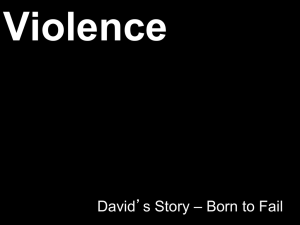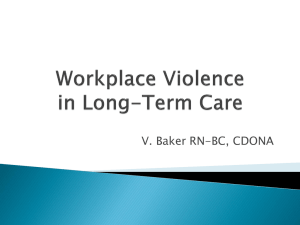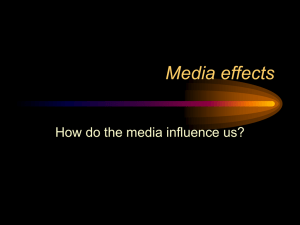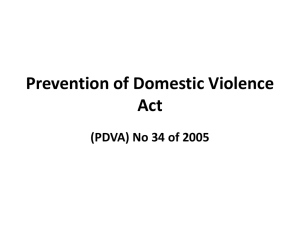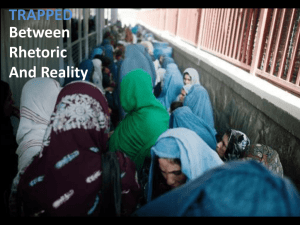PVAW - End violence against women by strengthening prevention
advertisement
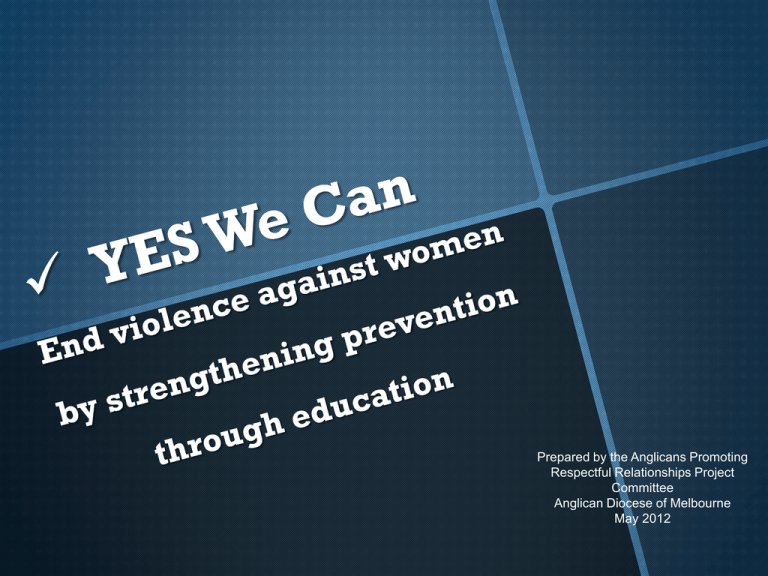
Prepared by the Anglicans Promoting Respectful Relationships Project Committee Anglican Diocese of Melbourne May 2012 Christians believe human beings are created in the likeness of God, which demands a concern for the dignity and inherent rights of men, women and children The cornerstone of Christian belief is the example of the life of Jesus Christ, who demonstrated high regard for the dignity of women, respected them, and entrusted them with his mission Living Christian faith warrants ending all forms of violence Anglican communities are the right people to address violence, a crisis that threatens the preservation of our Christian principles WHAT IS GENDER BASED VIOLENCE? (GBV) The term gender-based violence is an umbrella term for any harmful act that is perpetrated against a person’s will, and that is based on socially-ascribed (gender) differences between males and females. While GBV is usually targeted at women and girls, boys and men may also be survivors of GBV. GBV can occur within the family or community and, is perpetrated by persons in positions of power. FORMS OF GENDER BASED VIOLENCE Physical abuse Financial abuse Property damage Social isolation Emotional abuse Spiritual abuse Threats Primary prevention seeks to prevent violence against women before it occurs in the first instance Strategies which do not have a focus on violence but address its underlying causes, such as, adherence to rigid gender stereotypes and unequal power relations between men and women, are primary prevention strategies A woman is killed in Australia almost every week by a partner or ex-partner More than 1 in 3 Australian women (34%) who have had an intimate partner, have experienced violence from a partner or ex-partner 31% of women who experienced physical violence in the past 12 months were assaulted by a current and/or previous partner, compared to 4.4% of men An estimated 1 in 4 children and young people have witnessed violence against their mother or step-mother. The Impact of the Problem (WHO 2002; VicHealth 2004; KPMG 2009) Women exposed to violence risk developing health problems including: anxiety, depression, pain syndromes and phobias For women under 45, intimate partner violence contributes more to their poor health and death than any other risk factor, including high blood pressure, obesity and smoking 1 in 4 Victorian children have witnessed intimate partner violence. This exposure increases their risk of mental health, behavioral and learning difficulties in the short term, and of developing mental health problems later in life Violence against women and their children cost the Australian economy $13.6 billion in 2008-09. If there is no reduction in current rates, it will cost the economy an estimated $15.6 billion by 2021-22 Australia identified 3 factors that determine its prevalence Unequal power relations between men and women Rigid gender stereotyping of women and men Tolerance of violence in popular culture (VicHealth 2012) Determinant 1 Unequal Power Relationships Between Men and Women Research shows that ‘violence supportive attitudes’ are more likely to exist in cultures where unequal power relations and rigid gender roles between men and women exist (WHO 2004) Using inappropriate male power at an individual level • • • • He acts like he is the boss He acts like she is a slave for him He acts like the master of his castle She must ask him to do anything He is teaching her about his power and control DETERMINANT 1 Unequal Power Relations between men and women Factors which affect attitudes to violence against women across society • • • • Tolerance of violence in our society A link between viewing of pornography and electronic games which demean/degrade women Structural barriers and institutionalised discrimination Use of the media to perpetuate myths and reduce empathy for victims DETERMINANT 1 Unequal power relations between men and women Sandra Bem Sandra Bem (1993) identifies three common beliefs about women and men in western society and that these beliefs have led to rigid stereotypes 1. Women and men have basically different psychological and sexual natures; 2. Men, are the superior, dominant gender; 3. Gender differences and male superiority are natural Costs in Terms of Psychological Well-Being and Relationships Research has found that MEN who adopt a rigid masculine gender role: • • • • • Are more likely to be upset if their wives earn more money than they do; Are less likely to be comfortable with child care; Are less likely to ask for help when they need it; Are less likely to be sympathetic and tender; Are less likely to be tolerant of their spouses’ faults Costs in Terms of Psychological Well-Being and Relationships Research has found WOMEN who adopt a rigid feminine gender role: • • • • Appear to have lower self-esteem; Are less capable of bouncing back from failure; Are more likely to believe that women are to be seen and not heard; Are more likely to conform to group pressure MINI PLENARY How has what’s been talked about here impacted on you? Register your interest on line www. melbourne anglican. com. au Want to find out more? Complete and send off the ‘register your interest form’ in the Anglican Peer Mentor Brochure Contact the Project Coordinator to talk to members of your parish about their involvement bodde@bigpond.com.au MINI PLENARY What actions will I take to pursue this matter? THANK YOU For participating in this workshop. We’d like to know what you thought about it and if it was helpful to you. You do not need to give your name Please use the form being circulated to provide your feedback about your experience



